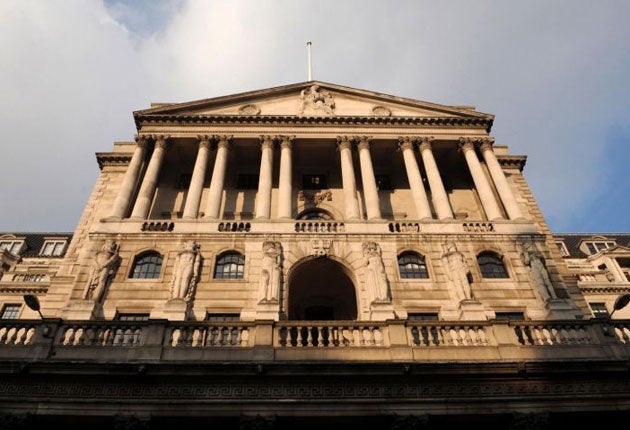
The Bank of England resisted further emergency action today despite fears that the economy will go into reverse by the end of the year.
The Bank's Monetary Policy Committee (MPC) kept interest rates at their record lows of 0.5% and maintained its quantitative easing programme at £275 billion after October's shock increase.
The MPC pumped an extra £75 billion into the economy last month amid signs that the recovery was faltering and while the picture in the UK and eurozone has worsened, economists do not expect further action until early next year.
The Bank unanimously voted for the QE boost amid fears that growth in the UK will grind to a halt by the end of the year, while Bank governor Sir Mervyn King warned that the UK could be facing "the most serious financial crisis" it has ever seen.
Today's decision came as the European Commission, the executive arm of the European Union, slashed its growth forecast for the UK this year to 0.7% from 1.1% but said there were better prospects for exports.
The UK's gross domestic product (GDP) in the third quarter grew at a better-than-expected 0.5%, but economists have warned that the figure overstated the underlying health of the economy.
Howard Archer, chief UK and European economist at IHS Global Insight, said he expects the Bank to pump a further £50 billion into the economy in the first quarter of 2012.
He said: "We currently expect the economy to be stagnant over the fourth quarter of 2011 and the first quarter of 2012 before returning to gradual growth, but it is very possible that contraction will occur, especially if there is no easing in the eurozone's sovereign debt problems."
The Bank will publish its quarterly inflation report next week, which presents an assessment of inflation and growth prospects.
Vicky Redwood, chief UK economist at Capital Economics, expects the MPC to revise down both its growth and inflation forecasts "sharply" and "lay the foundations" for further QE.
But she added: "With the effectiveness of QE questionable, the MPC is also likely to have to think of different ways of supporting the economy."
David Kern, chief economist at the British Chambers of Commerce (BCC), said higher QE on its own was not enough.
He said: "Without effective measures to improve the flow of credit to businesses, particularly smaller firms, the increase in QE will not achieve its full potential in supporting growth."
Purchasing Managers Index data for October on the powerhouse services sector and manufacturing industry, released shortly after, both pointed towards the UK economy contracting in the final three months of the year.
Meanwhile, the crisis in the eurozone - which the Bank cited as one of the key threats to the UK recovery - continues to escalate as EU leaders fail to reach an accord on solving the region's problems.
Italy has moved to the heart of the crisis as its borrowing costs soared into bailout territory yesterday amid increased uncertainty over its political future.
Elsewhere, trade figures for September showed the debt crisis had already started to have an impact on the UK economy as exports to the EU tumbled.
Holding interest rates will be welcomed by borrowers, with the price of a fixed-rate mortgage now at an all-time low as lenders factor in a longer spell with the Bank's base rate at rock bottom.
Elsewhere, lenders scaled back their forecast for home repossessions this year after figures for the latest quarter rose by less than expected.
Council of Mortgage Lenders director general Paul Smee said the fall in the number of mortgages in arrears and the stable picture on repossessions were testament to the "beneficial effects of low interest rates".
But the extended period of lower lending costs spells more misery for pensioners and savers, who will continue to suffer low returns on their money at a time when high inflation is eroding the value of their deposits.
PA
Subscribe to Independent Premium to bookmark this article
Want to bookmark your favourite articles and stories to read or reference later? Start your Independent Premium subscription today.

Join our commenting forum
Join thought-provoking conversations, follow other Independent readers and see their replies